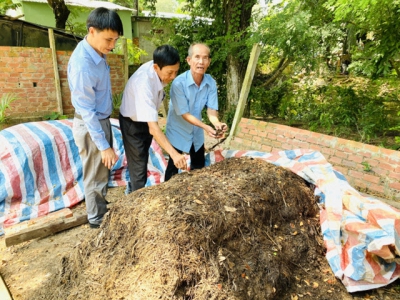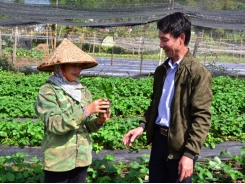Awareness training on Vietnam organic agriculture in crop production

Over 400 trainees from colleges, businesses, and cooperatives participated in the program titled 'Awareness training on Vietnam organic agriculture in crop production'.
Farmers compost organic manure to fertilize crops. Photo: Le Hoang Vu.
NHO presented a program named "Awareness training on Vietnam organic agriculture in crop production" (Session 2) on December 16. The event is part of a series of activities aimed at connecting trade, agricultural product consumption, and training classes aimed at enhancing production, business, and sales capacity in line with the trend of digital transformation and in response to the challenges posed by the Covid-19 pandemic for businesses, cooperatives, cooperative groups, business households, and OCOP subjects.
The organizer predicted that via this training course, the business community would overcome obstacles sparked by the Covid-19 epidemic, adapt to the trend of digital transformation, enhance their production and business management capabilities, and successfully connect to the market.
Experts discussed organic agriculture in Vietnam, how to apply fertilizers and enhance soil, and how to handle plant pests organically. Participants' questions were thoroughly addressed by specialists both during and after the event.
Mr. Tran The Nhu Hiep, Deputy General Director of the NGO, stated: "Organic agriculture is now an inevitable trend in order to limit the use of chemical fertilizers, preserve public health, and create safe, high-quality agricultural goods for customers." There are four guiding concepts in organic agriculture.
To begin, organic agriculture should preserve and improve the health of the soil, plants, animals, humans, and the planet as a cohesive, entire, and indivisible unit.
The second is the ecosystem: Organic agriculture should be founded on living ecosystems and natural cycles, functioning within them, according to their principles, and contributing to their integrity and harmony.
Thirdly, organic agriculture must be built in such a way that it ensures justice to the general environment and living possibilities for all living creatures.
Finally, there is the prudential principle: organic agriculture should be handled carefully and responsibly in order to safeguard the health and well-being of current and future generations, as well as the environment.
Related news
Tools

Phối trộn thức ăn chăn nuôi

Pha dung dịch thủy canh

Định mức cho tôm ăn

Phối trộn phân bón NPK

Xác định tỷ lệ tôm sống

Chuyển đổi đơn vị phân bón

Xác định công suất sục khí

Chuyển đổi đơn vị tôm

Tính diện tích nhà kính

Tính thể tích ao



 Local breeders shift to livestock biosecurity in Mekong…
Local breeders shift to livestock biosecurity in Mekong…  Fruit and vegetable exports to China in danger…
Fruit and vegetable exports to China in danger…